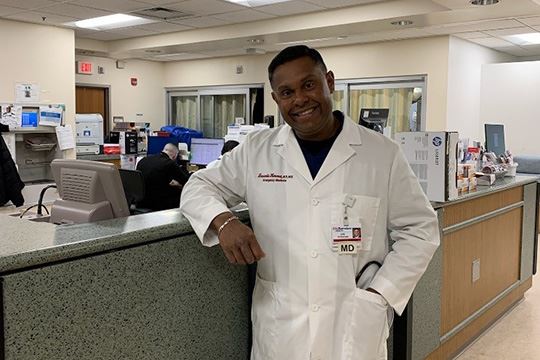When Should You Go to the Emergency Department?

Don’t hesitate to get prompt care when you experience key signs of trouble.
People often put off going to the Emergency Department (ED) or commonly termed Emergency Room when they shouldn’t wait. “They think their health issue will turn out to be nothing serious,” says Lasanta Horana, MD, Emergency Department Chair and a Medical Staff Officer at Robert Wood Johnson University Hospital Hamilton (RWJUH Hamilton). “But with many emergencies, including heart attack or stroke, time is very important. Waiting too long after symptoms start can limit our ability to give effective treatment.” Are your symptoms nothing to worry about—or do you need a trip to the ED?
Warning signs that deserve to be checked right away include these common areas of concern:
Chest Pain, especially if the pain is a type you haven’t had before, makes you anxious or is associated with shortness of breath or sweating. “We’re here to determine if anything life threatening can be causing your symptoms,” Dr. Horana says. “Come in so we can do appropriate tests.” Very often, if you go to an urgent care with this complaint, you will likely be referred to come to the ED so that we can perform the necessary evaluation including labs, imaging, or seeing a cardiologist.
Breathing Problems. Any time you have serious breathing problems, especially if you have a chronic respiratory issue such as asthma or COPD, call 911. Emergency responders can help stabilize you with medication and oxygen even before you get to the ED.
High Fever. Elevated body temperature, especially if it’s accompanied by shaking and chills, could be a sign of infection that has moved to the bloodstream. “We treat this very aggressively,” Dr. Horana says. For children especially, go to the ED if fever is accompanied by severe headache, rash, lethargy or other unusual behavior.
Abdominal Pain, especially if it’s accompanied by fever, is localized in one area of the abdomen or is accompanied by severe vomiting or diarrhea. “Gastrointestinal concerns such as appendicitis and bowel obstruction are emergencies that may require surgery,” Dr. Horana says. If there is a serious issue, we have the appropriate surgeons and the GI physicians on staff that can respond quickly after we identify the source of the problem.
A Head Injury, especially if you were stunned or lost consciousness; are taking blood thinners; are elderly; or have symptoms such as weakness, numbness, confusion, lethargy, or change in their mentation or vision problems.
Stroke or Neurological Symptoms. If new and different neurological symptoms occur, such as weakness or numbness in any part of your body, unsteady gait, dizziness, asymmetric smile, or a change in speech or vision, call 911 and get to the ED as quickly as you can. If identified quickly we can often treat a stroke and provide a consult with a neurologist rapidly in the ED that can potentially lead to a better outcome with a stroke.
Behavioral Crisis. If you’re having thoughts of harming yourself or others, or are suffering from a narcotic or alcohol overdose, call 911. “We can give reversal agents for certain narcotic or other drug overdoses, monitor vital signs, administer fluid and connect people with counselors and recovery rehab services,” Dr. Horana says.
Don’t be embarrassed if a worrisome symptom turns out to be nothing. “We’re here to assess these issues,” Dr. Horana says. “We’re happy if chest pain turns out to be acid reflux and not a heart attack. But getting checked out ensures we don’t miss serious cases.”
“I was in the Emergency Room for a foot related injury, and I want to thank the nurses. They were so nice and took such good care of me. To show my appreciation I came back and brought them bagels, donuts and muffins. I appreciate all you do as essential workers. From the bottom of my heart, thank you,” shared Rob A., a patient who shared this public message on Robert Wood Johnson University Hospital Hamilton’s Facebook Page after a recent visit to the Emergency Department.
Follow us on our social channels.
Facebook: @RWJ Hamilton
LinkedIn: Robert Wood Johnson University Hospital Hamilton
Twitter: @RWJHamilton
Instagram: RWJUH_Hamilton